Mashallah Tabarakallah: Meaning and Significance -Best 2023
“Mashallah Tabarakallah” is a common phrase used in Islamic culture, particularly among Arabic speakers. It is often said when someone shares good news or shows something impressive, such as a new car, a beautiful piece of art, or a newborn baby.
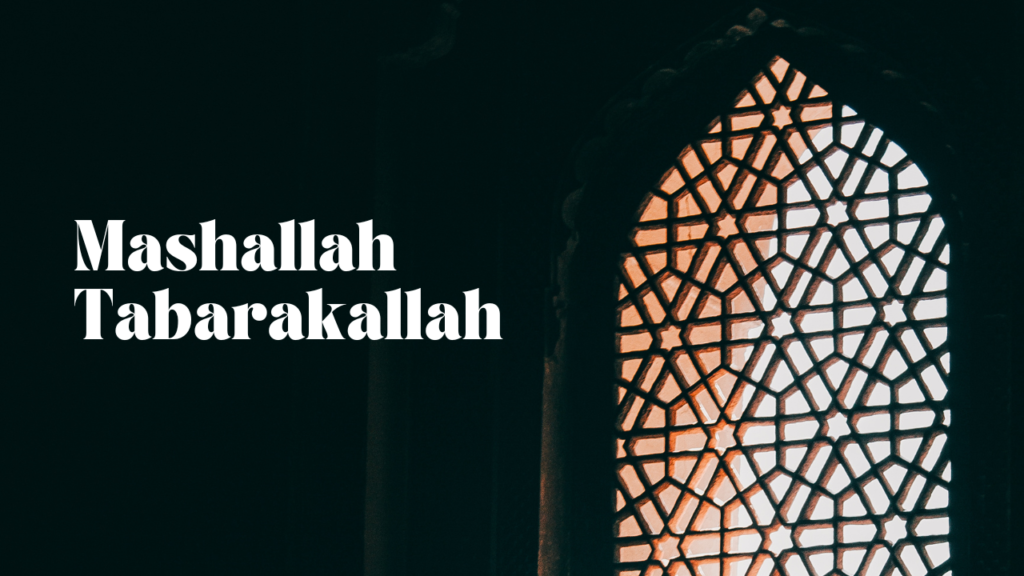
Translation of “Mashallah Tabarakallah”
The phrase “Mashallah” is a combination of two Arabic words, “Ma” and “Shaa Allah.” “Ma” means “what” or “that,” while “Shaa Allah” translates to “God wills it.” Thus, “Mashallah” means “that which God has willed” or “what God has willed”.
“Tabarakallah” comes from the Arabic word “baraka,” which means “blessing.” The suffix “Allah” means “God.” Thus, “Tabarakallah” means “God has blessed it” or “blessed be God”.
Mashallah Tabarakallah in english
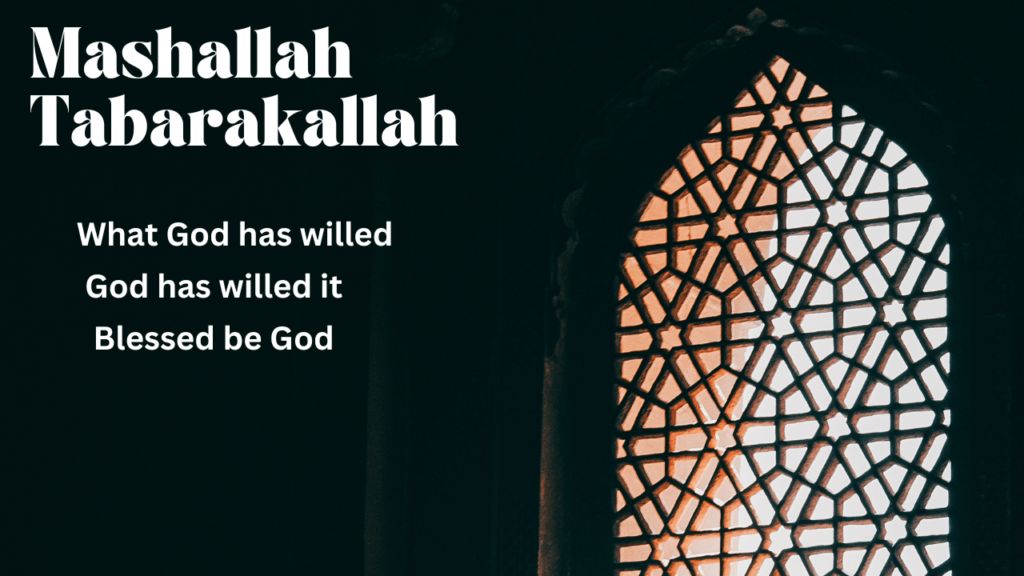
The English translation of “Mashallah Tabarakallah” is “God has willed it” or “what God has willed“, and “blessed be God“.
Mashallah Tabarakallah in arabic
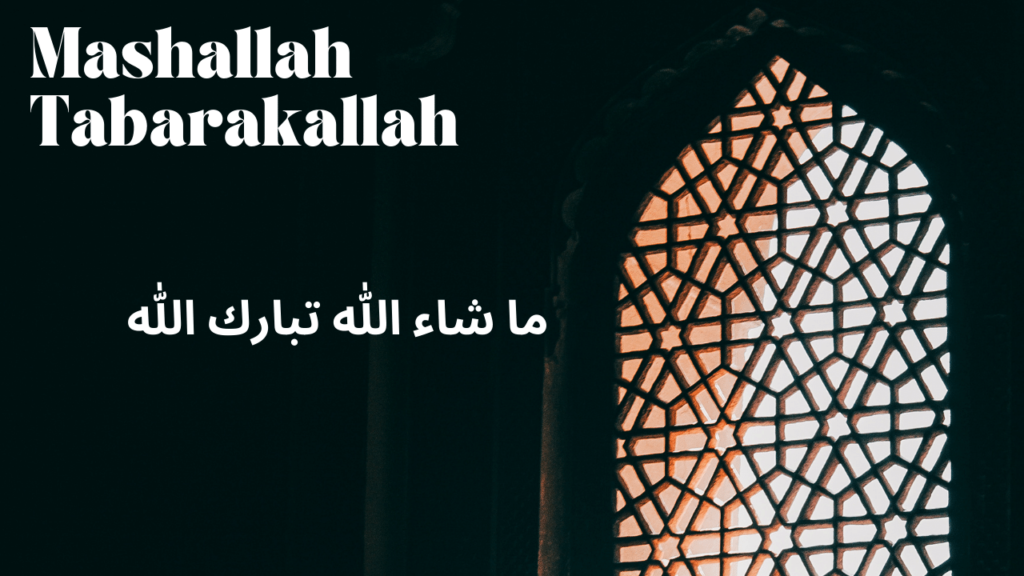
“Mashallah Tabarakallah” is already an Arabic phrase. In Arabic script, it is written as “ما شاء الله تبارك الله”.
Mashallah Tabarakallah in urdu
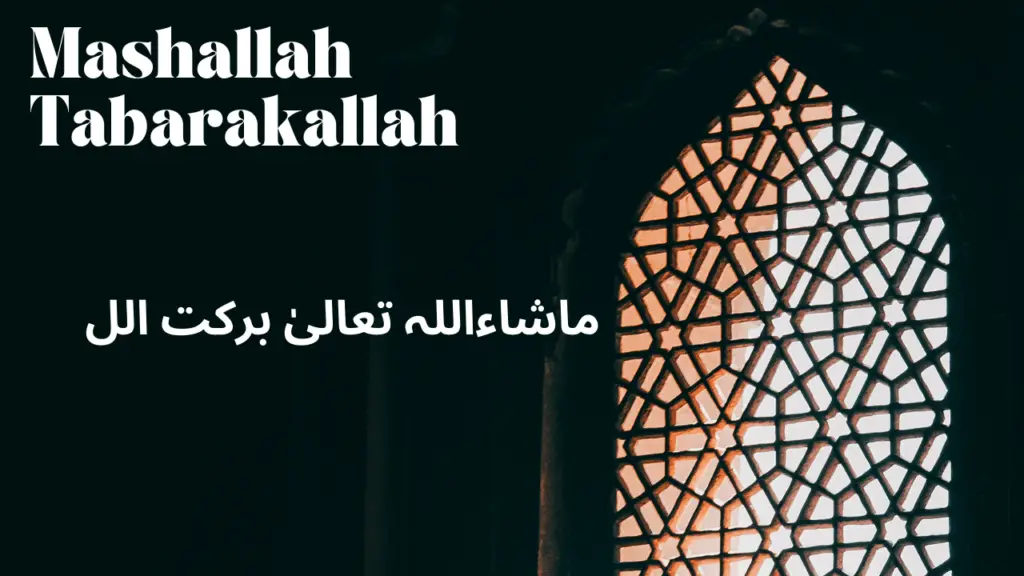
The Urdu translation of “Mashallah Tabarakallah” is “ماشاءاللہ تعالیٰ برکت اللہ” (Mashallah Ta’ala Barakallah).
Mashallah Tabarakallah in hindi
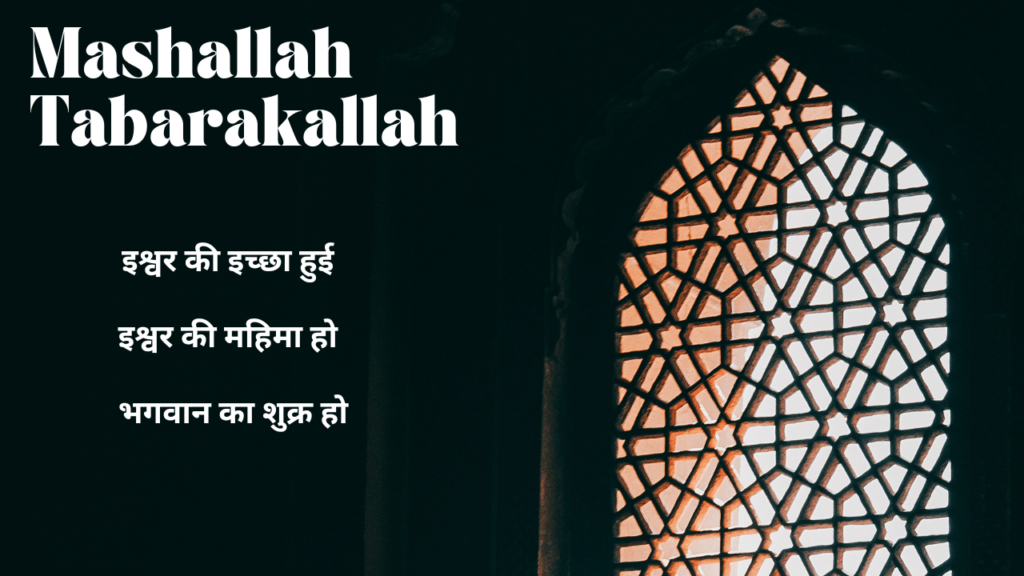
The Hindi translation of “Mashallah Tabarakallah” is “इश्वर की इच्छा हुई” (Ishwar ki iccha hui) or “इश्वर की महिमा हो” (Ishwar ki mahima ho) and “भगवान का शुक्र हो” (Bhagwan ka shukr ho). However, the phrase “Mashallah Tabarakallah” is typically used in its original Arabic form by Hindi-speaking Muslims.
What does “Mashallah Tabarakallah” mean?
The phrase “Mashallah” translates to “God has willed it” or “what God has willed”, while “Tabarakallah” means “blessed be God”. Together, the phrase expresses gratitude for the blessings and good fortune that God has bestowed upon us.
When to say mashallah tabarakallah?
“Mashallah Tabarakallah” is typically said in situations where someone shares good news or shows something impressive, such as a new car, a beautiful piece of art, or a newborn baby. It can also be used when admiring a person’s talent or accomplishment. In general, the phrase is used to express gratitude and acknowledge God’s blessings, so it can be appropriate to say “Mashallah Tabarakallah” in many situations where one wants to show appreciation and humility.
Mashallah Tabarakallah reply
In response to hearing someone say “Mashallah Tabarakallah”, it is common for Muslims to reply with “JazakAllah Khair” which means “May Allah reward you with goodness” or simply “Ameen” which means “May it be so”. Both responses convey gratitude and a desire for the person to be blessed with even more good things in the future.
The significance of “Mashallah Tabarakallah”
In Islamic culture, saying “Mashallah Tabarakallah” is considered a way to protect oneself from envy or the evil eye. It is believed that envy can cause harm to the person who is the target of envy, even if it is unintentional. By acknowledging God’s role in one’s blessings and expressing gratitude, it is believed that one can ward off the negative effects of envy.
Using “Mashallah Tabarakallah” in daily life
Saying “Mashallah Tabarakallah” is a way to show appreciation and gratitude for the blessings in our lives. It can be used in a variety of situations, from admiring someone’s new outfit to congratulating a friend on a promotion. It is also appropriate to say when seeing a beautiful natural landscape or a majestic animal, as a way to appreciate the beauty of God’s creation.
Conclusion
In conclusion, “Mashallah Tabarakallah” is a phrase deeply rooted in Islamic culture, and its translation and significance provide valuable insights into the Islamic worldview. It serves as a reminder to express gratitude for the blessings in our lives and acknowledge God’s role in them. By using this phrase in daily life, individuals can cultivate humility, avoid envy, and appreciate the beauty of God’s creation. The phrase “Mashallah Tabarakallah” is an important part of Islamic culture and can serve as a source of inspiration and guidance for all those who seek to live a life of gratitude and humility.
Faqs about “Mashallah Tabarakallah”
What does “Mashallah Tabarakallah” mean?
“Mashallah Tabarakallah” is an Arabic phrase that means “God has willed it” or “what God has willed,” and “blessed be God.”
Why do Muslims say “Mashallah Tabarakallah”?
Muslims say “Mashallah Tabarakallah” to express gratitude for the blessings and good fortune that God has bestowed upon them. It is also used as a way to ward off envy or the evil eye.
Is “Mashallah Tabarakallah” only used by Muslims?
While “Mashallah Tabarakallah” is commonly used by Muslims, the phrase has been adopted by many people of different cultures and religions, particularly those who speak Arabic.
Can “Mashallah Tabarakallah” be used in any situation?
“Mashallah Tabarakallah” is typically used in situations where someone shares good news or shows something impressive, such as a new car, a beautiful piece of art, or a newborn baby. It is also appropriate to use when seeing a beautiful natural landscape or a majestic animal.
How does saying “Mashallah Tabarakallah” protect against envy or the evil eye?
It is believed that envy can cause harm to the person who is the target of envy, even if it is unintentional. By acknowledging God’s role in one’s blessings and expressing gratitude, it is believed that one can ward off the negative effects of envy.
What does mashallah tabarakallah mean?
“Mashallah Tabarakallah” is an Arabic phrase commonly used by Muslims, which can be translated into English as “God has willed it” or “what God has willed,” and “blessed be God.” It is a way of expressing appreciation and gratitude for the blessings and good fortune that God has bestowed upon us, and acknowledging God’s role in them. The phrase is also used as a way to ward off envy or the evil eye.